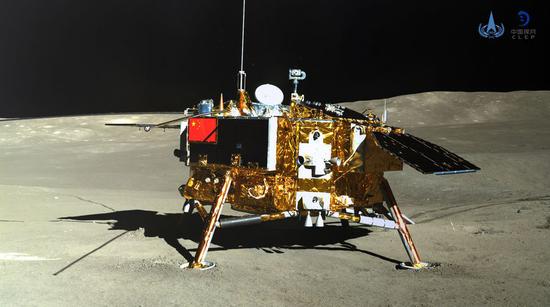China's lunar rover unveils underground secrets on far side of moon

Photo taken by the rover Yutu-2 (Jade Rabbit-2) on Jan. 11, 2019 shows the lander of the Chang'e-4 probe. (Xinhua/China National Space Administration)
China's lunar rover Yutu-2, or Jade Rabbit-2, has helped scientists unveil the secrets buried deep under the surface on the far side of the moon, enriching human's understanding about the history of celestial collision and volcanic activities and shedding new light on the geological evolution on the moon.
China's Chang'e-4 probe made the first-ever soft landing on the eastern floor of the Von Karman Crater within the South Pole-Aitken Basin on the far side of the moon on Jan. 3, 2019. After its landing, the spacecraft immediately deployed its Yutu-2 rover, which uses Lunar Penetrating Radar (LPR) to investigate the underground it roams.
A study conducted by a research team led by Li Chunlai and Su Yan at the National Astronomical Observatories of the Chinese Academy of Sciences (NAOC) reveals what lurks below the lunar surface.
As a result of the tidal locking effect, the moon's revolution cycle is the same as its rotation cycle, and the same side always faces Earth.
The research team used the LPR on Yutu-2 to send radio signals deep into the surface of the moon, reaching a depth of 40 meters by the high-frequency channel of 500 MHz -- more than three times the depth previously reached by the Chang'e-3 lunar probe, which was sent to the near side of the moon at the end of 2013.
This data allowed the researchers to develop an image of the subsurface stratigraphy of the far side of the moon.
The study was published in the latest issue of Science Advances.
